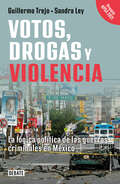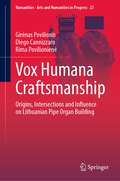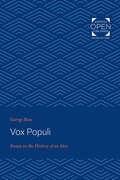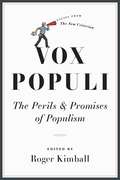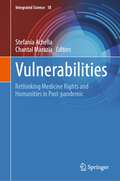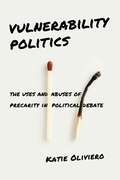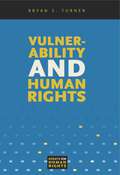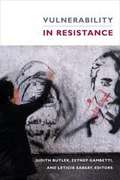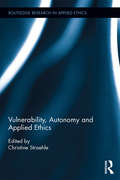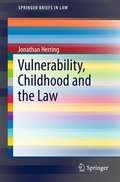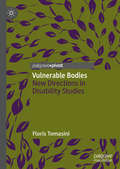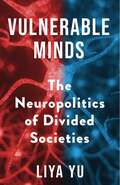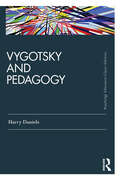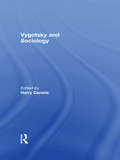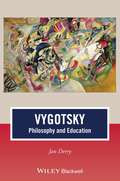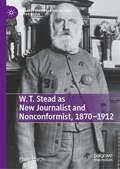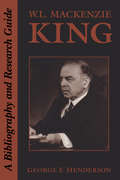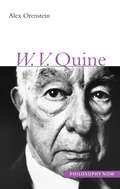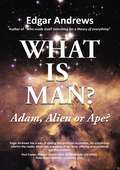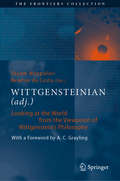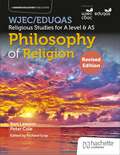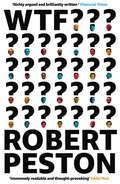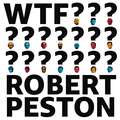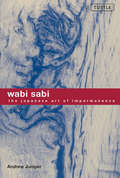- Table View
- List View
Votos, drogas y violencia
by Guillermo Trejo¿POR QUÉ A MEDIDA QUE LA DEMOCRACIA SE HA CONSOLIDADO EN MÉXICO LA VIOLENCIA A GRAN ESCALA SE HA MULTIPLICADO?. Guillermo Trejo y Sandra Ley ofrecen en este libro una teoría novedosa y necesaria sobre la violencia criminal, que enfatiza la influencia crucial de la política. A partir de estudios de caso en profundidad y análisis estadísticos que abarcan más de dos décadas y distintos niveles de gobierno, muestran que los procesos de transición democrática, aunados a la fragmentación del poder político, pudieron ser la causa principal del estallido e intensificación de las guerras en México, así como su expansión a las esferas de la política local y la sociedad civil. A diferencia de estudios previos, que ven a los grupos de crimen organizado como empresas económicas libres que operan en oposición a las autoridades estatales, Trejo y Ley los conciben como grupos ilegales íntimamente relacionados con el Estado. Por tanto, estos grupos responden al cambio político: el crimen organizado no puede existir ni operar con éxito si no cuenta con algún grado de protección estatal. Los autores denominan a esa intersección colaborativa zona gris, un espacio donde los grupos criminales pueden respirar, crecer, reproducirse y triunfar. Sin embargo, cuando la esfera del poder estatal cambia, el equilibrio de la zona gris también lo hace y eso genera violencia. Votos, drogas y violencia propone un nuevo enfoque político que amplía nuestra comprensión del crimen organizado y de las condiciones que propician la guerra y la paz en el inframundo criminal.
Vox Humana Craftsmanship: Origins, Intersections and Influence on Lithuanian Pipe Organ Building (Numanities - Arts and Humanities in Progress #23)
by Rima Povilionienė Girėnas Povilionis Diego CannizzaroThis book provides a thorough analysis focused on the sound expression produced by human-crafted musical instrument – a pipe organ, in which various components blend into a complex whole to produce a wide range of timbres. The sound produced by wooden and metal pipes of a variety of sizes is an integral part of the instrument’s unique character, while the organ stop is like its signature, from which one can judge about the size and style of the instrument, an organ building school or even an organ master, to which it is attributable. Precise identification of the name of the stop in accordance to both the pipework itself and the authentic inscriptions on the pipes is instrumental in investigating the geographic origins and authorship of an organ. The monograph focuses on the craftsmanship of complex and historically influential organ stop Vox humana. Its research and definition provides specific information distinguishing particular features in the variety of organ building traditions and discussing the differences in organ sound perception and production. The volume is aimed at art and music historians, as well as musicologists and scholars researching restoration techniques.The book contains supplemental material with video and audio material as well as photo-documentation of authentic Vox humana examples. The material is placed in the online catalog, which may be accessed by scanning the QR code in the appendix of the book.dsgdsgds
Vox Populi: Essays in the History of an Idea (Seminar in the History of Ideas)
by George BoasOriginally published in 1969. The proverb vox populi, vox Dei first appeared in a work by Alcuin (ca. 798), who wrote that "the people [] are to be led, not followed. [] Nor are those to be listened to who are accustomed to say, 'The voice of the people is the voice of God.'" Tracing the changing meaning of the saying through European history, George Boas finds that "the people" are not an easily identifiable group. For many centuries the butt of jokes and the substance of comic relief in serious drama, the people became in time an object of pity and, later, of aesthetic appeal. Popular opinion, despised in ancient Rome, was something sought, after the French Revolution. The first essay documents the use of the titular proverb through the eighteenth century. In the next six essays, Boas attempts to determine who the people were and how writers and philosophers have regarded them throughout history. He also examines the people as the creators of literature, art, and music, and as the subject of others' artistic representations. In a final essay, he discusses egalitarianism, which has given a voice to the common person. Animating Boas's account is his own belief in the importance of the individual's voice—as opposed to the voice of the masses, which is by no means necessarily that of God or reason.
Vox Populi: The Perils & Promises of Populism
by Roger KimballBeginning with a reflection on the problems of populism for American conservatism, the essays expound broadly and deeply on populist unrest--the populist revolts of ancient Rome, the rise of popular referenda and the Brexit vote, American populism and the legacy of H. L. Mencken, populism and the Founders' generation, populism and identity, populism around the world, the birth of a new American populist movement, and populism's historical impact on the American party system. The book concludes with a discussion of the struggle to keep government in the hands of a free people.
Vulnerabilities: Rethinking Medicine Rights and Humanities in Post-pandemic (Integrated Science #18)
by Stefania Achella Chantal MaraziaDrawing from a wide array of disciplinary perspectives and geographical contexts, this volume offers new insights for critically engaging with the problem of vulnerability. The essays here contained take the move from the COVID-19 pandemic, in order to explore the inherent vulnerability of individuals, but also of social, economic and political systems, and probe the descriptive and prescriptive import of the concept.Each chapter provides a self-contained perspective on vulnerability, as well as a specific methodological framework for questioning its meaning. Taken together, the chapters combine into a multi-disciplinary toolkit for approaching the various forms and structures of vulnerability, with a special attention to the intersectional factors shaping the individual experience of it: from gender to age, from disability to mental illness, from hospitalisation to incarceration. The book explores the theoretical richness and complexity of the concept and proposes new analytical approaches to it, before illustrating its multifariousness through empirically grounded case studies. The closing section engages with “the future of vulnerability”, as a hermeneutic, epistemological, and critical-normative perspective to be deployed beyond the domain of global crises and emergencies.The volume is primarily intended as a reference for scholars in the human, social and health sciences. The accessible structure and plain language of the chapters make it also a valuable didactic resource for graduate courses in philosophy, the social sciences and public health.
Vulnerability Politics: The Uses and Abuses of Precarity in Political Debate
by Katie OlivieroA new understanding of vulnerability in contemporary political cultureProgressive thinkers have argued that placing the concept of vulnerability at the center of discussions about social justice would lead governments to more equitably distribute resources and create opportunities for precarious groups – especially women, children, people of color, queers, immigrants and the poor. At the same time, conservatives claim that their values and communities are vulnerable to attack–often by these same groups. In turn, they craft antidemocratic representations of vulnerability that significantly influence the political landscape, restricting human and legal rights for many in order to expand them for a historically privileged few.Vulnerability Politics examines how twenty-first century political struggles over immigration, LGBTQ rights, reproductive justice, and police violence have created a sense of vulnerability that has an impact on culture and the law. By researching organizations like the Minutemen (civilians who monitor the US/Mexico border), the Protect Marriage Coalition (a campaign to ban same-sex marriage in California), and the Center for Bio-Ethical Reform (an anti-abortion movement), Katie Oliviero shows how conservative movements use the rhetoric of risk to oppose liberal policies by claiming that the nation, family, and morality are imperiled and in need of government protection.The author argues that this sensationalism has shifted the focus away from the everyday and institutional precarities experienced by marginalized communities and instead reinforces the idea that groups only deserve social justice protections when their beliefs reflect the dominant nationalist, racial, and sexual ideals.
Vulnerability and Human Rights (Essays on Human Rights #1)
by Bryan S. TurnerThe mass violence of the twentieth century’s two world wars—followed more recently by decentralized and privatized warfare, manifested in terrorism, ethnic cleansing, and other localized forms of killing—has led to a heightened awareness of human beings’ vulnerability and the precarious nature of the institutions they create to protect themselves from violence and exploitation. This vulnerability, something humans share amid the diversity of cultural beliefs and values that mark their differences, provides solid ground on which to construct a framework of human rights.Bryan Turner undertakes this task here, developing a sociology of rights from a sociology of the human body. His blending of empirical research with normative analysis constitutes an important step forward for the discipline of sociology. Like anthropology, sociology has traditionally eschewed the study of justice as beyond the limits of a discipline that pays homage to cultural relativism and the “value neutrality” of positivistic science. Turner’s expanded approach accordingly involves a truly interdisciplinary dialogue with the literature of economics, law, medicine, philosophy, political science, and religion.
Vulnerability in Resistance
by Judith Butler Zeynep Gambetti Leticia SabsayVulnerability and resistance have often been seen as opposites, with the assumption that vulnerability requires protection and the strengthening of paternalistic power at the expense of collective resistance. Focusing on political movements and cultural practices in different global locations, including Turkey, Palestine, France, and the former Yugoslavia, the contributors to Vulnerability in Resistance articulate an understanding of the role of vulnerability in practices of resistance. They consider how vulnerability is constructed, invoked, and mobilized within neoliberal discourse, the politics of war, resistance to authoritarian and securitarian power, in LGBTQI struggles, and in the resistance to occupation and colonial violence. The essays offer a feminist account of political agency by exploring occupy movements and street politics, informal groups at checkpoints and barricades, practices of self-defense, hunger strikes, transgressive enactments of solidarity and mourning, infrastructural mobilizations, and aesthetic and erotic interventions into public space that mobilize memory and expose forms of power. Pointing to possible strategies for a feminist politics of transversal engagements and suggesting a politics of bodily resistance that does not disavow forms of vulnerability, the contributors develop a new conception of embodiment and sociality within fields of contemporary power.Contributors. Meltem Ahiska, Athena Athanasiou, Sarah Bracke, Judith Butler, Elsa Dorlin, Basak Ertür, Zeynep Gambetti, Rema Hammami, Marianne Hirsch, Elena Loizidou, Leticia Sabsay, Nükhet Sirman, Elena Tzelepis
Vulnerability, Autonomy, and Applied Ethics (Routledge Research in Applied Ethics)
by Christine StraehleVulnerability is an important concern of moral philosophy, political philosophy and many discussions in applied ethics. Yet the concept itself—what it is and why it is morally salient—is under-theorized. Vulnerability, Autonomy, and Applied Ethics brings together theorists working on conceptualizing vulnerability as an action-guiding principle in these discussions, as well as bioethicists, medical ethicists and public policy theorists working on instances of vulnerability in specific contexts. This volume offers new and innovative work by Joel Anderson, Carla Bagnoli, Samia Hurst, Catriona Mackenzie and Christine Straehle, who together provide a discussion of the concept of vulnerability from the perspective of individual autonomy. The exchanges among authors will help show the heuristic value of vulnerability that is being developed in the context of liberal political theory and moral philosophy. The book also illustrates how applying the concept of vulnerability to some of the most pressing moral questions in applied ethics can assist us in making moral judgments. This highly innovative and interdisciplinary approach will help those grappling with questions of vulnerability in medical ethics—both theorists and practitioners—by providing principles along which to decide hard cases.
Vulnerability, Childhood and the Law (SpringerBriefs in Law)
by Jonathan HerringThis book will challenge the orthodox view that children cannot have the same rights as adults because they are particularly vulnerable. It will argue that we should treat adults and children in the same way as the child liberationists claim. However, the basis of that claim is not that children are more competent than we traditionally given them credit for, but rather that adults are far less competent than we give them credit for. It is commonly assumed that children are more vulnerable. That is why we need to have a special legal regime for children. Children cannot have all the same rights as adults and need especial protect from harms. While in the 1970s “child liberationists” mounted a sustained challenge to this image, arguing that childhood was a form of slavery and that the assumption that children lacked capacity was unsustainable. This movement has significantly fallen out of favour, particularly given increasing awareness of child abuse and the multiple ways that children can be harmed at the hands of adults. This book will explore the concept of vulnerability, the way it used to undermine the interests of children and our assumptions that adults are not vulnerable in the same way that children are. It will argue that a law based around mutual vulnerability can provide an approach which avoids the need to distinguish adults and children.
Vulnerable Bodies: New Directions in Disability Studies
by Floris TomasiniThis book offers new direction in disability studies, by integrating the medical and social model of disability. The first aim is to provide an integral approach to thinking about impairment and disability through the integrative lens of being vulnerable. The second aim is to transcend the normative trap which impairment and disability debate finds itself locked in.Disability debate is trapped in a normative struggle to escape oppressive norms. Either, by legitimizing the desire to be free from impairment, where a legitimization identity is promoted through the medical model. Or, by resisting discriminative social norms, where the desire is to be free from oppressive social barriers that exist on top of having impairment. Identifying with one’s vulnerability, or embodied uncertainty, allows for the possibility of forging meaning and building new identity. It allows freedom to express embodied difference, rather than to transform or defend it.
Vulnerable Minds: The Neuropolitics of Divided Societies
by Liya YuNeuroscience research has raised a troubling possibility: Could the tendency to stigmatize others be innate? Some evidence suggests that the brain is prone to in-group and out-group classifications, with consequences from ordinary blind spots to full-scale dehumanization. Many are inclined to reject the argument that racism and discrimination could have a cognitive basis. Yet if we are all vulnerable to thinking in exclusionary ways—if everyone, from the most ardent social-justice advocates to bigots and xenophobes, has mental patterns and structures in common—could this shared flaw open new prospects for political rapprochement?Liya Yu develops a novel political framework that builds on neuroscientific discoveries to rethink the social contract. She argues that our political selves should be understood in terms of our shared social capacities, especially our everyday exclusionary tendencies. Yu contends that cognitive dehumanization is the most crucial disruptor of cooperation and solidarity, and liberal values-based discourse is inadequate against it. She advances a new neuropolitical language of persuasion that refrains from moralizing or shaming and instead appeals to shared neurobiological vulnerabilities. Offering practical strategies to address those we disagree with most strongly, Vulnerable Minds provides timely guidance on meeting the challenge of including and humanizing others.
Vygotsky and Pedagogy
by Harry DanielsThe Routledge Classic Edition of Daniels’ influential 2001 text Vygotsky and Pedagogy explores the growing interest in Vygotsky and the pedagogic implications of the body of work that is developing under the influence of his theories. With a new preface from Harry Daniels this book explores the growing interest in Vygotsky and the pedagogic implications of the body of work that is developing under the influence of his theories. It provides an overview of the ways in which the original writing has been extended and identifies areas for future development. The author considers how these developments are creating new and important possibilities for the practices of teaching and learning in school and beyond, and illustrates how Vygotskian theory can be applied in the classroom. The book is intended for students and academics in education and the social sciences and will be of interest to all those who wish to develop an analysis of pedagogic practice within and beyond the field of education.
Vygotsky and Sociology
by Harry DanielsBuilding on earlier publications by Harry Daniels, Vygotsky and Sociology provides readers with an overview of the implications for research of the theoretical work which acknowledges a debt to the writings of L.S. Vygotsky and sociologists whose work echoes his sociogenetic commitments, particularly Basil Bernstein. It provides a variety of views on the ways in which these two, conceptually linked, bodies of work can be brought together in theoretical frameworks which give new possibilities for empirical work. This book has two aims. First, to expand and enrich the Vygotskian theoretical framework; second, to illustrate the utility of such enhanced sociological imaginations and how they may be of value in researching learning in institutions and classrooms. It includes contributions from long-established writers in education, psychology and sociology, as well as relatively recent contributors to the theoretical debates and the body of research to which it has given rise, presenting their own arguments and justifications for forging links between particular theoretical traditions and, in some cases, applying new insights to obdurate empirical questions. Chapters include: Curriculum and pedagogy in the sociology of education; some lessons from comparing Durkheim and Vygotsky Dialectics, politics and contemporary cultural-historical research, exemplified through Marx and Vygotsky Sixth sense, second nature and other cultural ways of making sense of our surroundings: Vygotsky, Bernstein, and the languaged body Negotiating pedagogic dilemmas in non-traditional educational contexts Boys, skills and class: educational failure or community survival? Insights from Vygotsky and Bernstein. Vygotsky and Sociology is an essential text for students and academics in the social sciences (particularly sociology and psychology), student teachers, teacher educators and researchers as well as educational professionals.
Vygotsky: Philosophy and Education (Journal of Philosophy of Education)
by Jan DerryVygotsky Philosophy and Education reassesses the works of Russian psychologist Lev Vygotsky work by arguing that his central ideas about the nature of rationality and knowledge were informed by the philosophic tradition of Spinoza and Hegel. Presents a reassessment of the works of Lev Vygotsky in light of the tradition of Spinoza and Hegel informing his work Reveals Vygotsky’s connection with the work of contemporary philosophers such as Brandom and McDowell Draws on discussions in contemporary philosophy to revise prominent readings of Vygotskian psychology and revisits educational debates where Vygotsky’s ideas were central Reveals the limitations of appropriations of Vygotsky which fail to recognize the Hegelian provenance of his work Shows the relevance of Brandom’s inferentialism for contemporary educational theory and practice
W. T. Stead as New Journalist and Nonconformist, 1870-1912 (Palgrave Studies in the History of the Media)
by Philip MarchThis book is an in-depth study of the influence of evangelical Nonconformity on the evolving journalism of W. T. Stead, one of the leading British newspaper editors of the late-nineteenth century. While Stead&’s Christian beliefs have been examined alongside and complementary to his journalism, no long study has yet interrogated the way in which Protestant Dissent helped to shape the development of his press practice. This study explores the stimulating interconnections in Stead&’s &‘New Journalism&’ between late-nineteenth century evangelicalism, radical politics, and social reform, and the modes and formats of his writing.
W.L. Mackenzie King
by George F. HendersonThis comprehensive bibliography on William Lyon Mackenzie King, the most prominent Canadian politician in the first half of the twentieth century, will be an invaluable reference tool for researchers in archives and libraries, as well as for political scientists, historians, journalists, and book collectors.In this volume Henderson provides comprehensive lists of books, articles, and other material written by King or about him and his era, and includes a series of appendices relating to studies on King and miscellaneous material pertaining to his life and career. In addition, Henderson provides a list of unsigned articles by King that appeared in newspapers and periodicals, and of sound recordings and motion picture footage relating to him. Finally, he identifies all forewords and prefaces written by King, plays written about him, and books and poems dedicated to him.
W.V.O.Quine (Philosophy Now Ser.)
by Alex OrensteinThe most influential philosopher in the analytic tradition of his time, Willard Van Orman Quine (1908-2000) changed the way we think about language and its relation to the world. His rejection of the analytic/synthetic distinction, his scepticism about modal logic and essentialism, his celebrated theme of the indeterminacy of translation, and his advocacy of naturalism have challenged key assumptions of the prevailing orthodoxy and helped shape the development of much of recent philosophy. This introduction to Quine's philosophical ideas provides philosophers, students and generalists with an authoritative analysis of his lasting contributions to philosophy. Quine's ideas throughout are contrasted with more traditional views, as well as with contemporaries such as Frege, Russell, Carnap, Davidson, Field, Kripke and Chomsky, enabling the reader to grasp a clear sense of the place of Quine's views in twentieth-century philosophy and the important criticisms of them.
WHAT IS MAN?: Adam, Alien or Ape?
by Edgar AndrewsIn 1906, American humorist Mark Twain published a sixty-page essay entitled “What is man?” Consisting of an interminable dialogue between a senior citizen (who believes that man is just a machine) and a young man (who believes nothing in particular but is open to persuasion), it wasn’t one of his finest books. But at least he tried. Authors since then seem to have avoided the subject like the plague, often tackling the respective roles of men and women in society but seldom asking deeper questions about what it means to be human. When the psalmist asked, “What is man?” (Psalm 8 v.4) he was, I think, seeking an altogether more profound answer.Avoidance of the subject is all the more strange because there has never been a time like our own when curiosity about human origins and destiny has been greater, or the answers on offer more hotly disputed. It’s a safe bet that any attempt to give the “big picture” on the origin, nature and specialness of mankind will be contentious —which might explain why writers have generally fought shy of it. Yet at heart it is the question most of us really do want answered, because the answer defines that precious thing we call our identity, both personally and as a race.The Psalmist did, of course, offer his own answer three millennia ago. Man, he claimed, was created by God for a clearly defined purpose — to exercise dominion over planet earth and (by implication) to ultimately share something of the glory of the divine nature. The rest, as they say, is history, but it’s not a happy tale. As Mark Twain says in another essay; “I can’t help being disappointed with Adam and Eve”. Not surprisingly, then, a large proportion of humanity today are looking for alternative solutions, accepting the challenge of the Psalmist’s question without embracing the optimism of his answer.In this book we are going to consider the alternative solutions on offer by considering what it means to be human against the backgrounds of cosmology (man’s place in the universe), biology (man’s place in the animal kingdom), and psychology (man’s consciousness and mind). Finally, we return to the biblical context, arguing that the Psalmist got it right after all.Don’t let the science-sounding stuff put you off. Like its popular prequel, “Who made God? Searching for a theory of everything”, this book is written with a light touch in a reader-friendly and often humorous style. It is intended specifically for the non-expert, with homely verbal illustrations designed to explain and unpack the technicalities for the lay-person. As Dr. Paul Copan (Pledger Family Chair of Philosophy and Ethics, Palm Beach Atlantic University) says, "Edgar Andrews has a way of making the profound accessible. His scholarship informs the reader about key questions of our time, offering wise guidance and illumination."
WITTGENSTEINIAN: Looking at the World from the Viewpoint of Wittgenstein's Philosophy (The Frontiers Collection)
by Shyam Wuppuluri Newton Da Costa“Tell me," Wittgenstein once asked a friend, "why do people always say, it was natural for man to assume that the sun went round the earth rather than that the earth was rotating?" His friend replied, "Well, obviously because it just looks as though the Sun is going round the Earth." Wittgenstein replied, "Well, what would it have looked like if it had looked as though the Earth was rotating?” What would it have looked like if we looked at all sciences from the viewpoint of Wittgenstein’s philosophy? Wittgenstein is undoubtedly one of the most influential philosophers of the twentieth century. His complex body of work has been analysed by numerous scholars, from mathematicians and physicists, to philosophers, linguists, and beyond. This volume brings together some of his central perspectives as applied to the modern sciences and studies the influence they may have on the thought processes underlying science and on the world view it engenders. The contributions stem from leading scholars in philosophy, mathematics, physics, economics, psychology and human sciences; all of them have written in an accessible style that demands little specialist knowledge, whilst clearly portraying and discussing the deep issues at hand.
WJEC/Eduqas Religious Studies for A Level & AS - Philosophy of Religion Revised
by Richard Gray Karl LawsonOur popular Philosophy of Religion student book has been completely revised and updated to provide a single book for AS and A-level. Written by a team of experienced teachers and authors with an in-depth understanding of teaching, learning and assessment at AS and A-level, this accessible and engaging student book will support your students throughout the course and help them prepare for the exams. - Submitted for endorsement to WJEC/Eduqas to ensure high quality support you can trust- Updated to provide improved mapping to the specifications with focused content and support in a single book for A Level and AS, offering excellent value for money- Accessible language and appealing layout help your students more easily engage with the information and get the most out of the course- Provides a skill-based approach to learning, which combines content of the course and exam preparation throughout, helping students to develop important exam skills right from the start- Key terms and ideas are clearly identified and defined throughout- Regular exam practice questions with advice and exemplar answers help students prepare for the exams
WJEC/Eduqas Religious Studies for A Level & AS - Philosophy of Religion Revised
by Richard Gray Karl LawsonOur popular Philosophy of Religion student book has been completely revised and updated to provide a single book for AS and A-level. Written by a team of experienced teachers and authors with an in-depth understanding of teaching, learning and assessment at AS and A-level, this accessible and engaging student book will support your students throughout the course and help them prepare for the exams. - Submitted for endorsement to WJEC/Eduqas to ensure high quality support you can trust- Updated to provide improved mapping to the specifications with focused content and support in a single book for A Level and AS, offering excellent value for money- Accessible language and appealing layout help your students more easily engage with the information and get the most out of the course- Provides a skill-based approach to learning, which combines content of the course and exam preparation throughout, helping students to develop important exam skills right from the start- Key terms and ideas are clearly identified and defined throughout- Regular exam practice questions with advice and exemplar answers help students prepare for the exams
WTF?: A Times top 10 bestseller
by Robert PestonTHE TOP 10 BESTSELLER'Richly argued and brilliantly written... a deeply thoughtful analysis that should be mandatory reading for anyone seeking to understand where we have gone wrong.' Vernon Bogdanor, Financial TimesIn WTF? Robert Peston draws on his years of experience as a political, economics and business journalist to show us what has gone bad and gives us a manifesto to put at least some of it right. Framed by two letters to his father (who died in early 2016) WTF? is Robert Peston's highly personal account of what those who have ruled us for years got so badly wrong, and what we need to do to mend the terrible fractures in our society.With characteristic passion and clarity he looks at what must happen to prevent democracy being subverted by technocratic geniuses with the ability to manipulate social media, how and whether it is possible to make a success of leaving the EU, what the lessons should be of the appalling Grenfell Tower tragedy, whether robots can be stopped from taking our work, what can be done to staunch the widening gap between rich and poor, and how to raise living standards for all.WTF? is a trenchant, often entertaining account of the recent past. It is also a call to action, giving hope to all of us who believe that taking back control is not only vital, but possible.'A manual for our times that everyone should read.' Matthew d'Ancona
WTF?: A Times top 10 bestseller
by Robert PestonTHE TOP 10 BESTSELLER 'Richly argued and brilliantly written... a deeply thoughtful analysis that should be mandatory reading for anyone seeking to understand where we have gone wrong.' Vernon Bogdanor, Financial Times In WTF? Robert Peston draws on his years of experience as a political, economics and business journalist to show us what has gone bad and gives us a manifesto to put at least some of it right. Framed by two letters to his father (who died in early 2016) WTF? is Robert Peston's highly personal account of what those who have ruled us for years got so badly wrong, and what we need to do to mend the terrible fractures in our society. With characteristic passion and clarity he looks at what must happen to prevent democracy being subverted by technocratic geniuses with the ability to manipulate social media, how and whether it is possible to make a success of leaving the EU, what the lessons should be of the appalling Grenfell Tower tragedy, whether robots can be stopped from taking our work, what can be done to staunch the widening gap between rich and poor, and how to raise living standards for all. WTF? is a trenchant, often entertaining account of the recent past. It is also a call to action, giving hope to all of us who believe that taking back control is not only vital, but possible. 'A manual for our times that everyone should read.' Matthew d'Ancona
Wabi Sabi
by Andrew JuniperWabi sabi, the quintessential Japanese design aesthetic, is quickly gaining popularity around the world, as evidenced by recent articles in Time, The Chicago Tribune and Kyoto Journal. Taken from the Japanese words wabi, which translates to less is more, and sabi, which means attentive melancholy, wabi sabi refers to an awareness of the transient nature of earthly things and a corresponding pleasure in the things that bear the mark of this impermanence. As a design style, wabi sabi helps us to appreciate the simple beauty in imperfection--of a chipped vase or a rainy day, for example.
